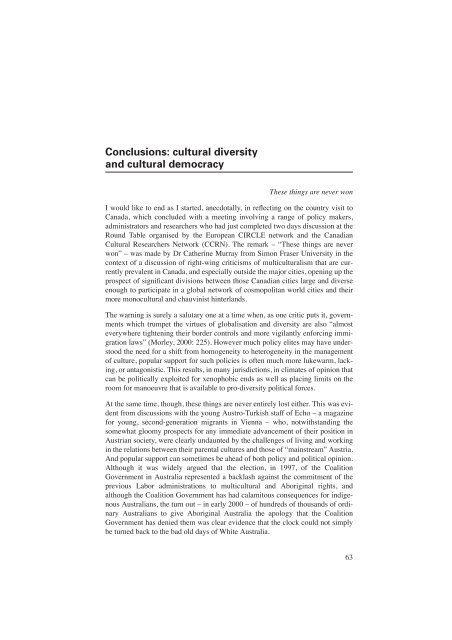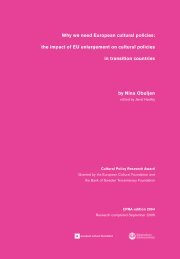<strong>Differing</strong> <strong>diversities</strong>classes artists or audiences in terms <strong>of</strong> their ethnicity; and the difficulty whitepolicy makers and researchers experience when trying to learn more about thecultural activities <strong>of</strong> ethnic minorities or indigenous peoples who, complainingthat they have been virtually studied to death in the context <strong>of</strong> colonial historiesand administrations, are understandably reluctant to collaborate in such inquiries.It needs to be recognised, however, that, as cultural policies assume an increasingimportance in view <strong>of</strong> their now evident economic significance in the knowledgeand information economies <strong>of</strong> developed societies, so they are also likely to besubjected to increasingly sophisticated forms <strong>of</strong> quantitative assessment. This, inturn, is likely to mean that cultural policy approaches to diversity will need to followsuit if they are to compete with other cultural policy agendas or, just as important,be effectively integrated with them. Since “governing by numbers” isinescapably a central aspect <strong>of</strong> modern technologies <strong>of</strong> government, culturaldiversity policies will need to develop approaches to the production <strong>of</strong> culturaldiversity indicators that can allow them to function effectively in the context <strong>of</strong>such technologies. This requires a closer statistical knowledge <strong>of</strong> the ways inwhich everyday cultural practices map on to the key social variables <strong>of</strong> gender,age, class, and ethnicity – and the relations between these – than is presently availablein most jurisdictions. 1At the same time, the need for qualitative forms <strong>of</strong> assessment is increasinglyrecognised. These are, indeed, crucial if cultural diversity policies are to engagewith the ways in which the relations between different cultures are experienced bythose who live at their intersections. They are also crucial if the relations betweencultural diversity and concerns about social cohesion, national identity and socialinclusion are to be addressed.The evidence to date suggests that this is much more likely to be successful whereassessment methodologies and processes actively involve the communities thatare concerned and, ideally, are led by members <strong>of</strong> those communities. 2 The studiesconducted in the United States by watchdog organisations like the NationalAssociation for the Advancement <strong>of</strong> Colored People seem especially promising inthis respect. It is also noticeable that the most critically valuable cultural diversityresearch in Austria is conducted by independent research organisations while, inCanada, the work <strong>of</strong> the independent Centre for Research-Action on RaceRelations is impressive in its methodological innovations and the clarity <strong>of</strong> itsfocus.__________1. See, for an indication <strong>of</strong> the issues involved here, <strong>Bennett</strong>, Emmison and Frow, 1999.2. I draw here on research position paper 2: “Assessing the implementation <strong>of</strong> cultural diversity policies”by Arnold J. Love.62
Conclusions: cultural diversityand cultural democracyThese things are never wonI would like to end as I started, anecdotally, in reflecting on the country visit toCanada, which concluded with a meeting involving a range <strong>of</strong> policy makers,administrators and researchers who had just completed two days discussion at theRound Table organised by the <strong>Europe</strong>an CIRCLE network and the CanadianCultural Researchers Network (CCRN). The remark – “These things are neverwon” – was made by Dr Catherine Murray from Simon Fraser University in thecontext <strong>of</strong> a discussion <strong>of</strong> right-wing criticisms <strong>of</strong> multiculturalism that are currentlyprevalent in Canada, and especially outside the major cities, opening up theprospect <strong>of</strong> significant divisions between those Canadian cities large and diverseenough to participate in a global network <strong>of</strong> cosmopolitan world cities and theirmore monocultural and chauvinist hinterlands.The warning is surely a salutary one at a time when, as one critic puts it, governmentswhich trumpet the virtues <strong>of</strong> globalisation and diversity are also “almosteverywhere tightening their border controls and more vigilantly enforcing immigrationlaws” (Morley, 2000: 225). However much policy elites may have understoodthe need for a shift from homogeneity to heterogeneity in the management<strong>of</strong> culture, popular support for such policies is <strong>of</strong>ten much more lukewarm, lacking,or antagonistic. This results, in many jurisdictions, in climates <strong>of</strong> opinion thatcan be politically exploited for xenophobic ends as well as placing limits on theroom for manoeuvre that is available to pro-diversity political forces.At the same time, though, these things are never entirely lost either. This was evidentfrom discussions with the young Austro-Turkish staff <strong>of</strong> Echo – a magazinefor young, second-generation migrants in Vienna – who, notwithstanding thesomewhat gloomy prospects for any immediate advancement <strong>of</strong> their position inAustrian society, were clearly undaunted by the challenges <strong>of</strong> living and workingin the relations between their parental cultures and those <strong>of</strong> “mainstream” Austria.And popular support can sometimes be ahead <strong>of</strong> both policy and political opinion.Although it was widely argued that the election, in 1997, <strong>of</strong> the CoalitionGovernment in Australia represented a backlash against the commitment <strong>of</strong> theprevious Labor administrations to multicultural and Aboriginal rights, andalthough the Coalition Government has had calamitous consequences for indigenousAustralians, the turn out – in early 2000 – <strong>of</strong> hundreds <strong>of</strong> thousands <strong>of</strong> ordinaryAustralians to give Aboriginal Australia the apology that the CoalitionGovernment has denied them was clear evidence that the clock could not simplybe turned back to the bad old days <strong>of</strong> White Australia.63
- Page 5 and 6:
PrefaceThe present text constitutes
- Page 7:
Part IDiffering diversities:transve
- Page 11 and 12: The study: background, contextand m
- Page 13 and 14: Transversal study on the theme of c
- Page 15: Transversal study on the theme of c
- Page 18: Differing diversitiesi. new forms o
- Page 23 and 24: IntroductionTransversal perspective
- Page 25 and 26: Transversal study on the theme of c
- Page 27 and 28: The challenge of diversityCulture,
- Page 29 and 30: Transversal study on the theme of c
- Page 31 and 32: Transversal study on the theme of c
- Page 33 and 34: Diversity, citizenship, and cultura
- Page 35 and 36: Transversal study on the theme of c
- Page 37: Transversal study on the theme of c
- Page 40 and 41: Differing diversitieslanguages. The
- Page 42 and 43: Differing diversitiesprogrammes int
- Page 45 and 46: Culture, government and diversity:p
- Page 47 and 48: Transversal study on the theme of c
- Page 49 and 50: Transversal study on the theme of c
- Page 51 and 52: Transversal study on the theme of c
- Page 53: Transversal study on the theme of c
- Page 56 and 57: Differing diversitiesin the pursuit
- Page 58 and 59: Differing diversitiesthe need for m
- Page 60 and 61: Differing diversitiescircumstances
- Page 64 and 65: Differing diversitiesMy point, then
- Page 66 and 67: Differing diversitiesiii. that the
- Page 69: Transversal study on the theme of c
- Page 73 and 74: The consequences of European media
- Page 75 and 76: Reasearch position paper 1and contr
- Page 77 and 78: Reasearch position paper 1directly
- Page 79 and 80: Reasearch position paper 1There hav
- Page 81 and 82: Reasearch position paper 1presence
- Page 83 and 84: Reasearch position paper 1Strategic
- Page 85 and 86: Reasearch position paper 1New media
- Page 87 and 88: Reasearch position paper 1Blumler,
- Page 89 and 90: Reasearch position paper 1Hoffmann-
- Page 91 and 92: Reasearch position paper 1Pauwels,
- Page 93 and 94: Assessing the implementationof cult
- Page 95 and 96: Reasearch position paper 2tics abou
- Page 97 and 98: Reasearch position paper 2Act (GPRA
- Page 99 and 100: Reasearch position paper 2factually
- Page 101 and 102: Reasearch position paper 2The evalu
- Page 103 and 104: Reasearch position paper 2capacity
- Page 105 and 106: Reasearch position paper 2Luchtenbe
- Page 107 and 108: The cultural policies of the Europe
- Page 109 and 110: Reasearch position paper 3went, wou
- Page 111 and 112: Reasearch position paper 3The histo
- Page 113 and 114:
Reasearch position paper 3integrati
- Page 115 and 116:
Reasearch position paper 3of differ
- Page 117 and 118:
Reasearch position paper 3European
- Page 119 and 120:
Reasearch position paper 3voice to
- Page 121:
Reasearch position paper 3Howe, Mar
- Page 124 and 125:
Differing diversitiesContemporary d
- Page 126 and 127:
Differing diversitiesWhereas in the
- Page 128 and 129:
Differing diversitiesbuilding on th
- Page 130 and 131:
Differing diversitieswhen tackling
- Page 132 and 133:
Differing diversitiesand that is pr
- Page 134 and 135:
Differing diversitiesSennett, Richa
- Page 136 and 137:
Differing diversitiesallowing their
- Page 138 and 139:
Differing diversitiesNevertheless,
- Page 140 and 141:
Differing diversitiesgrowth also ex
- Page 142 and 143:
Differing diversitiesAt a deeper le
- Page 144 and 145:
Differing diversitiesconventional c
- Page 146 and 147:
Differing diversitiesworks, and the
- Page 148 and 149:
Differing diversitiesNational sover
- Page 150 and 151:
Differing diversitiesSimilarly, at
- Page 152 and 153:
Differing diversitiesCoombe, Rosema
- Page 154 and 155:
Differing diversitiesWoodmansee, Ma
- Page 156 and 157:
Differing diversitiesIndeed, which
- Page 158 and 159:
Differing diversitiesThe second maj
- Page 160 and 161:
Differing diversitiesexample by Hol
- Page 162 and 163:
Differing diversitiesincreased broa
- Page 164 and 165:
Differing diversities“Black Carib
- Page 166 and 167:
Differing diversitiesBunt, Gary, 19
- Page 169 and 170:
Preserving cultural diversity throu
- Page 171 and 172:
Reasearch position paper 7unique, t
- Page 173 and 174:
Reasearch position paper 7legislati
- Page 175 and 176:
Reasearch position paper 7appropria
- Page 177 and 178:
Reasearch position paper 7Indeed, m
- Page 179 and 180:
Reasearch position paper 7- means t
- Page 181 and 182:
Reasearch position paper 7cyberspac
- Page 183 and 184:
Reasearch position paper 7extended
- Page 185 and 186:
Reasearch position paper 7It is rec
- Page 187 and 188:
Reasearch position paper 7lose loca
- Page 189 and 190:
Reasearch position paper 7six proje
- Page 191 and 192:
Reasearch position paper 7and innov
- Page 193 and 194:
Reasearch position paper 7Programme
- Page 195 and 196:
Reasearch position paper 7Reference
- Page 197 and 198:
Reasearch position paper 7Papers on
- Page 199:
Reasearch position paper 7Swaminath
- Page 202:
Sales agents for publications of th














